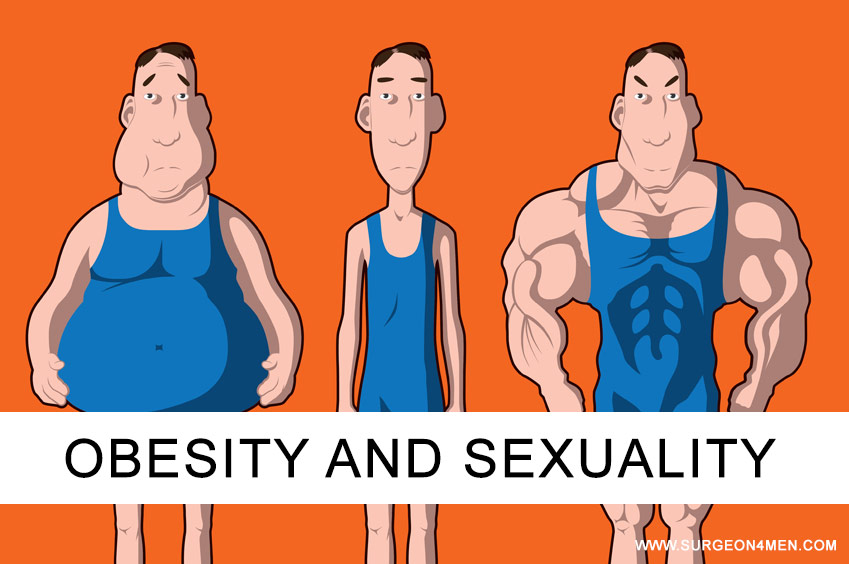Obesity and Sexuality
Obesity has long been a global metabolic and medical issue; primarily because, moderate obesity predisposes an individual to a variety of other health issues. This may range from circulatory deficits (such as hypertension, cardiovascular diseases and atherosclerosis) to metabolic derangements such as diabetes, hypercholesterolemia, hormonal dysfunction, psychological illnesses, systemic diseases and sexual disorders. Although, a slight decline has been observed in the global prevalence of obesity; about one-third of the entire US population is still clinically obese (1). This corresponds to about 78.6 million individual.
It has been observed that obesity can significantly influence your sex life directly (by diminishing stamina to carry out sexual activity) as well as indirectly by altering hormonal and biochemical balance in the body. Additionally, a number of metabolic and medical ailments that occur secondary to obesity can also lead to erectile dysfunction and sexual deficits.
How Obesity Can Affect Your Sexual Life?
Here are a few scientific explanations as to how obesity affects the sexual function in the affected individual.
Obese males tend to have a higher proportion of adipose tissues in the body. Research and clinical data indicates that adipose tissues serves as a perfect site for the conversion of large quantities of secreted testosterone into estrogen; thereby significantly affecting the sex drive (or libido in males). Additionally, adipose tissues also facilitate the release of sex hormone binding globulins (SHBG) that further decreases the concentration of free testosterone in the serum to carry out normal sexual functions (2). In younger population, obese males are prone to develop easy fatigability and feminine breasts (also referred to as gynecomastia) while obese females are prone to develop polycystic ovarian disease (PCOD), menstrual irregularity and thyroid problems.
-
Infertility
Obese males are more likely to develop infertility (or impaired fecundity) because higher body fat stores decreases the sperm quality. It has been speculated that men ingesting higher amounts of saturated fat have 35% lower total sperm count and 38% lower concentration of sperm as compared to those who consume healthy balanced diet (3).
-
Buried Penis Syndrome
The lump of fat above the waist may conceals the actual appearance of the penis (thereby making it look smaller than its original size), a condition referred to as the buried penis syndrome. It may significantly affect the sexual life of the individual by interfering with the confidence and body-image of self.
It is highly recommended not to confuse buried penis syndrome with congenital micro-penis (in which the penis is under 3cm in length regardless of the body fat concentration).
-
Sexual Infections and Unplanned Pregnancy
Due to decreased sexual drive, obese individuals are unaware of their sexual outcome. A study conducted in American obese population showed that obese females are four times more likely to get pregnant unplanned because they are not prepared for an intercourse in most cases and are not able to take proper contraceptive measures. Another French study found the same results in the male obese population.
Due to abnormal fat distribution in the body, it usually becomes fairly difficult for obese partners to copulate in all the sexual positions. The fat bulge over the belly prevents adequate penetration forcing partners to opt for the rear position which is very cumbersome for female partner to sustain due to long standing knee involvement.
-
Difficult to Find a Match
Needless to say that the world is getting superficial and judgmental with every passing day where individuals are mainly judged on physical looks and appearances. Obese people usually experience difficulty in finding the desired partner that further leads to sexual dysfunction and erectile issues due to psychological component.
-
Lack of self-reliance and Confidence
Obesity is mostly taken as a point to make fun of anyone and starts in a very early period of life without knowing other potentials of an individual. This degrades the confidence of an individual and develops a sense of deprivation. They start to dislike their own body and develops low self-esteem. It becomes very hard for them to have sex when all their lives they were called hideous. Collectively, all of it can make an obese person depressed making their sex life more pitiable.
-
Sluggishness and Laziness
Obesity can makes an individual lazy and prone to easy fatigability. Part of it is attributed to faulty physiological mechanics (that make individuals feel tired easily) and part of it is attributed to metabolic irregularities. Obese males are therefore unable to maintain an erection for longer periods.
Other Diseases Associated With Obesity
Central obesity or concentrated fat in the torso region predisposes an individual to develop other diseases which may hamper their sex life due to psychological, physiological or biochemical derangements. Individuals who are living with chronic health issues are more likely to feel agitated, nervous, depressed and fatigued due to adverse effect of medications or due to secondary complications of their health issues.
According to a study reported in the peer reviewed journal of Gender Medicine (4), investigators suggested that moderate obesity significantly increases the risk of type 2 diabetes that may have a deleterious effect on the normal sexual function due to neuropathy and vascular damage. Moreover, co-existing diabetes and obesity can lead to cardiovascular dysfunction and may impair the blood flow to the penile tissue; thereby further adding the damage.
All in all, it is pretty evident that obesity can have potential side effects on the sex life of an individual. Fortunately, most men can observe drastic improvement in the quality of their sex life with weight modification and lifestyle changes.
References:
- Ogden, C. L., Carroll, M. D., Kit, B. K., & Flegal, K. M. (2014). Prevalence of childhood and adult obesity in the United States, 2011-2012. JAMA, 311(8), 806-814.
- Wang, C., Jackson, G., Jones, T. H., Matsumoto, A. M., Nehra, A., Perelman, M. A., … & Cunningham, G. (2011). Low testosterone associated with obesity and the metabolic syndrome contributes to sexual dysfunction and cardiovascular disease risk in men with type 2 diabetes. Diabetes care, 34(7), 1669-1675.
- Ferilization, M. O. N. I. (2012). Impact of obesity on male fertility, sperm function and molecular composition.
- Han, T. S., Tajar, A., O’Neill, T. W., Jiang, M., Bartfai, G., Boonen, S., … & Wu, F. C. (2011). Impaired quality of life and sexual function in overweight and obese men: the European Male Ageing Study. European Journal of Endocrinology, 164(6), 1003-1011.



